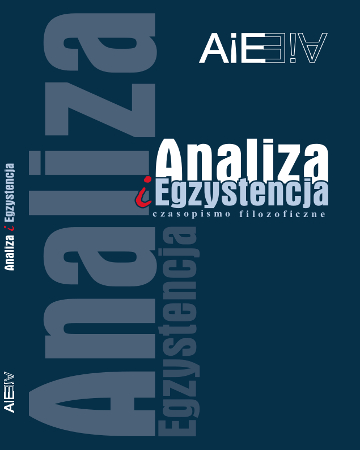
ISSN: 1734-9923
eISSN: 2300-7621
OAI
DOI: 10.18276/aie.2016.36-03






Lista wydań /
36 (2016)
Zwierzę jako absolutny Inny-otwieranie nie/możliwości
| Autorzy: |
Patryk
Szaj
Uniwersytet im. Adama Mickiewicza w Poznaniu |
| Słowa kluczowe: | Keywords: animal other ethics logocentrism deconstruction phenomenology Derrida Levinas Heidegger |
| Data publikacji całości: | 2016 |
| Liczba stron: | 20 (53-72) |
Abstrakt
The starting point for consideration is to put the Emmanuel Levinas’s philosophy into question whether the status of “absolute Otherness” may also belong to the Other other than man. On the basis of the thought of Levinas it receives a negative responseand it is because of his involvement in the so-called anthropological machine (which he shares with Martin Heidegger and some other critics of metaphysics). But it is, however, possible to open the (broadly defined) phenomenological ethical thought drew on the achievements of Levinas to the question of the animal. This attempt might be centered around the proposals of Jacques Derrida, the author of the essay The Animal That Therefore I Am (More To Follow), where he spoke about the singularity of each animal, the problematic status of border between man and animal,and the being-with animals as a full-fledged modality of being. This is a provocative thought which asks us about our attitude to such issues as “responsibility” and “responsiveness”, “carno-phallogocentrism”, or the status of non-human animals. Derrida’s thought is here very close to some kind of phenomenological language, but it is rather the phenomenology of the otherness than the phenomenology of intentional subject. The same phenomenology that we find in Bernhard Waldenfels’s or John D. Caputo’s writing.
Pobierz plik
Plik artykułu
Bibliografia
| 1. | Agamben, G. (2008). Otwarte (fragmenty). Tłum. P. Mościcki. Krytyka Polityczna, |
| 2. | 1, 124–138. |
| 3. | Bednarek, J. (2008). Maszyna antropologiczna – instrukcja demontażu. Nowa Krytyka. |
| 4. | Czasopismo Filozoficzne. Pobrane z: http://www.nowakrytyka.pl/spip. |
| 5. | php?article435. |
| 6. | Berger, J. (1999). Po cóż patrzeć na zwierzęta? W: J. Berger, O patrzeniu (s. 5–39). |
| 7. | Tłum. S. Sikora. Warszawa: Aletheia. |
| 8. | Bielik-Robson, A. (2000). Inna nowoczesność. Pytania o współczesną formułę |
| 9. | duchowości. Kraków: Universitas. |
| 10. | Caputo, J.D. (1993b). Against Ethics. Contributions to a Poetics of Obligation with |
| 11. | Constant Reference to Deconstruction. Bloomington–Indianapolis: Indiana |
| 12. | University Press. |
| 13. | Caputo, J.D. (1993a). Demythologizing Heidegger. Bloomington–Indianapolis: |
| 14. | Indiana University Press. |
| 15. | Caputo, J.D. (2000). More Radical Hermeneutics. On Not Knowing Who We Are. |
| 16. | Bloomington–Indianapolis: Indiana University Press. |
| 17. | Caputo, J.D. (1987). Radical Hermeneutics. Repetition, Deconstruction, and the |
| 18. | Hermeneutic Project. Bloomington–Indianapolis: Indiana University Press. |
| 19. | Cavalieri, P. (2011). Dyskusja o zwierzętach: drugie spojrzenie. W: P. Singer (red.), |
| 20. | W obronie zwierząt (s. 84–104). Tłum. M. Betley. Warszawa: Czarna Owca. |
| 21. | DeGrazia, D. (2011). O byciu osobą poza gatunkiem Homo sapiens. W: P. Singer |
| 22. | (red.), W obronie zwierząt (s. 63–83). Tłum. M. Betley. Warszawa: Czarna |
| 23. | Owca. |
| 24. | Deleuze, G., Guattari, F. (2015). Tysiąc plateau. Tłum. J. Bednarek. Warszawa: |
| 25. | Fundacja Nowej Kultury Bęc Zmiana. |
| 26. | Derrida, J. (2009). An Interview with Jacques Derrida on the Limits of Digestion. |
| 27. | E-Flux, 1. Pobrane z: http://www.e-flux.com/journal/an-interview-with-jacques- |
| 28. | derrida-on-the-limits-of-digestion. |
| 29. | Derrida, J. (1991). „Eating Well”, Or the Calculation of the Subject: An Interview |
| 30. | with Jacques Derrida. W: E. Cadava, P. Connor, J.-L. Nancy (eds.), Who Comes |
| 31. | After the Subject (s. 96–119). New York–London: Routledge. |
| 32. | Derrida, J. (2004). Gościnność nieskończona. Tłum. P. Mościcki. Przegląd Filozoficzno- |
| 33. | Literacki, 3, 257–261. |
| 34. | Derrida, J. (1988). Mémoires pour Paul de Man. Paris: Galilée. |
| 35. | Derrida, J. (1998). O człowieku i zwierzęciu, Marksie i żałobie. Z Jacques’em |
| 36. | Derridą rozmawiają Małgorzata Kowalska i Jerzy Niecikowski. Przegląd |
| 37. | Filozoficzny – Nowa Seria, 1, 5–15. |
| 38. | Derrida, J. (2015a). O duchu. Heidegger i pytanie. Tłum. B. Brzezicka. Warszawa: |
| 39. | Wydawnictwo Naukowe PWN. |
| 40. | Derrida, J. (2001). Polityka przyjaźni. Tłum. T. Zarębski. Odra, 7–8, 46–52. |
| 41. | Derrida, J. (1992). Przemoc i metafizyka. Esej o myśli Emmanuela Levinasa. |
| 42. | W: J. Derrida, Pismo filozofii (s. 161–224). Tłum. B. Banasiak. Kraków: |
| 43. | Inter Esse. |